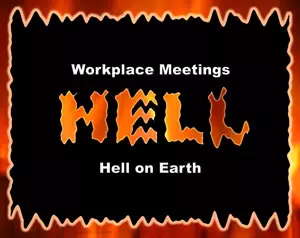Workplace Meetings and 3.5 Ways They Are Hell on Earth
Workplace meetings are one of the big three time wasters in business. They hurt productivity. They are more than that though. They are hell on earth.
How is that? Well, let us first visit Rick Warren, a global pastor and theologian. His post “What’s Hell Like?” citing the Bible gives four characteristics of hell. It is a:
- Place of torment
- Place of complete separation from other people
- Place without love
- Place where those who go there choose to do so
Workplace Meetings are Torment
Torment can be physical or mental. Warren tells us that “Luke 13:28 says that in Hell, ‘You will cry and be in extreme pain.’” This is easy. How many employees have frequently cried out in pain at having to sit through workplace meetings, at having lost valuable time? The complaints are endless.
We have even created a whole science around trying to make this torment “more effective.” The New York Times Magazine article, “Meet is Murder,” by Virginia Heffernan cites a long list of management fads promoting meetings. At some point though we have to ask, “Is trying to make meetings effective like trying to make crap edible?”
Workplace Meetings Separate Us from Other People

Workplace meetings are well documented as time wasters. As it turns out, they have much in common with hell.
Workplace meetings seem to bring people together. Prison camps do too. Effective torment reduces humanity, compassion for others. Meetings do this in two ways:
- Those who try to make the meeting worth their time are seen by others as only prolonging the torment, as showing no respect for their time.
- Extreme pain causes people to focus more and more on themselves, their own survival, their own loss of time and productivity.
Workplace meetings bring out the worst extroverted, alpha dog and narcissistic qualities in people. This does not build a sense of team or comradery. They crush it. The team separates. It becomes a collection of persons.
Workplace Meetings Are Loveless
“Honey, I am giving you an endless supply of meetings for your birthday.” Evidence shows that informal gatherings are far more productive, creative and relational than formal workplace meetings are. Would you rather meet a favored co-worker at a group function or over a cup of coffee?
Moreover, workplace meetings spread the “love” to those who are not there. Bain & Company studied a weekly executive meeting. Throughout the firm, on all levels, it cost the firm 300,000 hours a year in preparatory meetings and work.
People Choose Workplace Meetings
This is where I get my half a way. Sometimes people choose to hold or attend meetings. Other times they are told to be there. Still, someone has to choose to set a meeting.
People love to talk about themselves and their activities. It hits the deepest, strongest reward centers in their brains. It is a drug. Workplace meetings give an audience. They are the fix. Following up individually pales to meetings in this sense.
Choosing workplace meetings implies alternatives. Many show up in a search:
- Follow up or gather individually
- Use other forms of communication better
- Limit attendees and posting summaries
- Set digital tools to sort and prioritize email and other messages
Workplace Meetings are Hell on Earth
Since business people have a choice, their choice reflects on them. Meetings are hell on earth not only because they waste time and harm productivity. They crush morale. They crush sense of team. They crush management’s credibility. They crush leadership.
Yes, it is true. A few meetings are good. They are necessary. We cannot let this be our comfy justification blanket for such torment though. It cannot be the way we make crap edible.
As Warren says, we choose to go to hell. How can a firm that chooses such waste and destruction of a huge asset, its people, survive? How can it make sound business decisions in other areas?
It can because almost all firms choose hell. What kind of advantage would the firm have that did not choose it?


